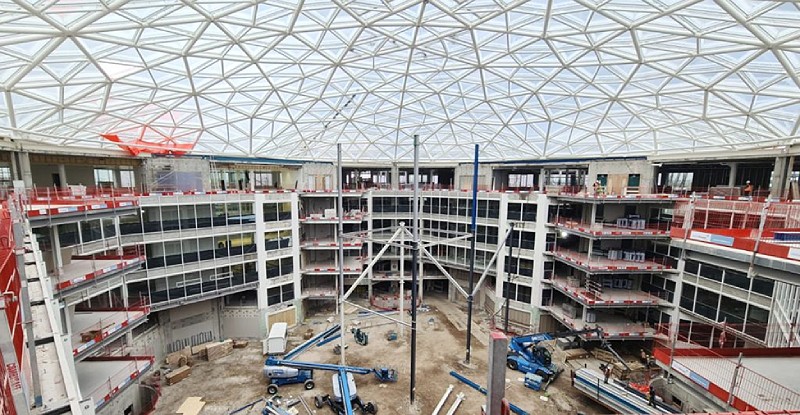The HVAC industry stands on the cusp of a transformation. Innovations in technology and a strong emphasis on sustainability are reshaping how heating, ventilation, and air conditioning systems are designed, installed, and managed. Whether you’re a subject matter expert or on the lookout for a construction career, understanding the latest trends is imperative. In this comprehensive guide, we cover key trends that HVAC professionals, construction community members, and general contractors must watch out for.
Eco-Friendly and Sustainable HVAC Solutions
The drive toward sustainability is more potent than ever, and eco-friendly HVAC solutions are at the forefront of this movement. The construction of ‘The Edge’ in Amsterdam showcases eco-innovations at their best. This building’s sophisticated HVAC system relies on solar power combined with an aquifer thermal energy storage system to slash energy consumption. By leveraging this combination, ‘The Edge’ excels in both energy efficiency and environmental stewardship.
 ‘The Edge’ in Amsterdam
‘The Edge’ in Amsterdam
Learn more about HVAC flexibility and energy monitoring in EDGE Amsterdam West multi-tenant healthy & smart office.
Eco-friendly systems are elevating sustainability while slashing operational costs. They embody the essence of innovation, and for professionals seeking to venture into this niche, online construction courses in sustainable HVAC design can offer the knowledge needed for a career boost.
Smart HVAC Systems
In an increasingly connected world, smart HVAC systems represent the intersection of comfort, convenience, and efficiency. Take the case of a state-of-the-art Smart Home in California, where the HVAC is seamlessly integrated with a home automation system. Remote control via smartphone apps, learning algorithms, and reactive weather adjustments are not science fiction – they’re here, and they’re transforming our living spaces.
Embracing smart technologies is crucial for a thriving career in HVAC. Construction education models are rapidly adapting, with HVAC courses introducing modules on IoT and smart system integration.
Geothermal HVAC Systems
Geothermal HVAC systems illustrate another stride toward sustainable solutions. Utilizing the earth’s stable subsurface temperature to heat or cool buildings, these systems showcase ingenuity and resourcefulness in HVAC design.
For engineers and architects engaging in HVAC or professional development programs, understanding geothermal solutions is becoming increasingly important. They not only offer a long-term reduction in utility costs but also align with the global agenda for sustainability.
Indoor Air Quality (IAQ) Improvements
The conversation around IAQ has intensified, especially with heightened awareness surrounding health and well-being in indoor environments. Technological advances in HVAC construction have brought about innovative solutions aimed at enhancing indoor air quality and ensuring the health and comfort of occupants.
For those in construction training and education focusing on Indoor Air Quality (IAQ), learn more about IAQ solutions from Developers: Apartment Fresh Air 101
HVAC System Customization and Personalization
The one-size-fits-all approach is no longer viable in the HVAC industry. Personalization and customization are taking center stage in providing efficient and effective HVAC solutions to meet individual needs. Whether for compact urban homes or large commercial spaces, HVAC systems must be adaptable and scalable.
Structured education, from HVAC to plumbing courses, is starting to emphasize the importance of designing systems tailored to specific environmental and architectural constraints. Modular construction adds another layer of complexity, requiring a nuanced understanding of prefabricated HVAC options.
- Comprehensive Guide to Modular& Prefab Construction Techniques
- Eco-Friendly Prefab Building: Impact on Environment & Site
Hybrid HVAC Systems
Hybrid HVAC systems, also known as dual-fuel systems, are becoming increasingly popular due to their energy efficiency and cost-effectiveness. As the name suggests, these systems utilize two sources of energy to heat your home: a traditional gas furnace and an electric heat pump. The system intelligently switches between the two energy sources based on outdoor temperatures, optimizing energy use and ensuring consistent comfort levels. By leveraging the strengths of both heating methods, hybrid HVAC systems provide a flexible, environmentally friendly solution for heating and cooling that can result in significant savings on energy bills.
AI and Machine Learning in HVAC
AI and machine learning applications within HVAC systems are no longer auxiliary – they’re essential. The AI-powered commercial building in New York City exemplifies the potential of these technologies in managing complex HVAC operations, boasting a commendable 15% reduction in energy consumption.
Professionals seeking to stay at the forefront must consider construction networking opportunities and workshops focusing on AI and machine learning in HVAC. These competencies are quickly becoming non-negotiable for leading the pack.
Robotic Approach in HVAC
In a bid to increase efficiency and accuracy, the HVAC industry is increasingly adopting a robotic approach. Robotic systems can access hard-to-reach places, reducing the need for manual labor and increasing safety. They can also perform complex tasks such as duct cleaning and inspection, reducing the time and cost associated with these procedures.
3D Printing in HVAC
3D printing technology is transforming the HVAC industry in numerous ways. For instance, it allows for the swift production of HVAC components, reducing the lead time for obtaining specialized parts. Moreover, 3D printing enables the creation of intricate designs that increase efficiency, such as heat exchangers with complex geometries that maximize heat transfer.
Innovative Tools in HVAC
The HVAC industry is not left behind in using innovative tools to enhance its services. Some of these tools include smart thermostats that allow remote control and monitoring of HVAC systems and predictive maintenance tools that use AI and machine learning to detect potential issues before they escalate. Additionally, energy management software offers the ability to monitor energy consumption and optimize HVAC system performance for greater energy efficiency.
Advances in HVAC Training and Education
Continuous professional development is essential in HVAC construction. Innovations drive the need for new skills and knowledge, inspiring industry leaders to pursue advanced training programs and courses like-
- HVAC Essentials: Heating, Ventilation & Air Conditioning Mastery
- Comprehensive Guide to HVAC Cooling Systems
Whether it’s mastering bespoke software, understanding modular construction intricacies, or staying current with electrical, plumbing, and structural courses, ongoing education is non-negotiable. HVAC professionals and general contractors should tap into construction networking events and subscribe to construction news to stay updated. Learn more about professional growth as an HVAC technician at STONEPILE llc’s Career Highlight—HVAC Technicians
Regulatory Changes and Compliance
Adherence to regulations and achieving compliance remain integral to the HVAC industry. Understanding the latest changes and participating in architecture courses or structure courses that address these nuances are vital.
Staying informed about regulatory updates is a responsibility that falls on all professionals, from mechanical and electrical engineers to architects and modular construction experts.
Conclusion
The HVAC industry is a dynamic field where change is the only constant. Driven by sustainability, technological advancements, and regulatory demands, it is witnessing a period of game-changing innovation. By understanding these developments and participating in related professional development, HVAC construction professionals can ensure they are equipped to lead the industry into a greener, smarter future.
In our fast-evolving world, where sustainability and efficiency are key, staying updated and adaptable is essential. Construction education is a continuous journey, growing with each new project and advancement.
Keep following our blog for in-depth updates on the latest HVAC trends. We’ll be covering each topic more thoroughly in our upcoming posts, providing useful tips and expert advice to help you keep up with the changes in HVAC construction. Stay tuned!
Stay connected on our social media.


